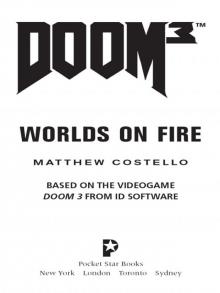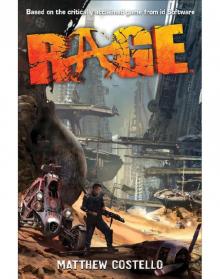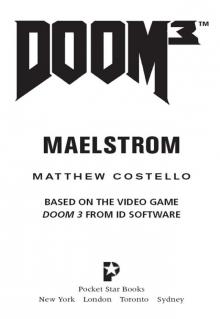- Home
- Matthew Costello
Doom 3™: Worlds on Fire Page 10
Doom 3™: Worlds on Fire Read online
Page 10
“Sergeant Mathews…Doctor.”
Graulich stepped closer. Some of the team were checking the crates that had been deposited at the cave entrance. But she imagined they were watching this little scene go down.
“Sergeant Mathews, let me ask you a question.”
“Shoot, ma—um, Doctor.”
“Do you think…do youimagine I asked for additional security for this site so that you marines could stand around the entrance as if someone was about to start a barbecue?”
Mathews looked away. She could see how young he was. They tookanyone for duty up here. Good thing they didn’t have to worry about other countries nosing around Mars City and the excavation sites. Or at least, they didn’t have to worry about that yet.
“No. I was really waiting to see what you wanted all these marines here for.”
“Good. Okay, for starters, Sergeant—get them a good fifty meters away from the entrance. I have more gear coming and I don’t need the loaders navigating around them.”
Mathews turned. “Okay.Listen up, men. Take a position out there”—a confirming look at Graulich—“fifty meters or so.”
For a second no one moved.Guess the marines aren’t too impressed by Mathews being in charge. But slowly they started trudging away.
He turned back to Graulich.
“Good. Okay, let me explain very clearly what’s going to happen, and what you’re going to do. You see, in here, we’re going to start some days of heavy drilling and explosions. It’s what we’re supposed to do. And the thing is, no one is supposed to see any of it. Not you, not them. Understand?”
“Yes, I—”
“And I’ve asked for more security for two reasons, Sergeant. Got your ears on?” He nodded. And she had the thought that maybe she should ease up on him. But no—this was too much fun.We all need something to ease the tension. “I don’t want, and your general doesn’t want, anyone to come near here that isn’t supposed to be here. And further, we’re not sure what other pockets and holes may open up…up here, all around the site as we excavate. So your little band of marines…I want them posted all around.”
Mathews looked to the cave roof and nodded. “You mean on top, and—what? Surrounding the place?”
“Such a smart marine. If they see anything, any opening that—again—we don’t want anyone entering, they let you know and then you let me know, and life is good.”
“Got it.”
“I’m afraid they will be on their own—lot of ground to cover. So they won’t be able to BS with each other. Like I just saw them doing.”
“Right.”
“One more thing, Mathews.”
“Yes, Dr. Graulich?”
“If you feel, as the leader of this squad, that you need more marines out here on patrol while we set off explosives, while we dig—you just let me know?”
“I will.”
Graulich smiled. She almost added,Good boy. “Glad we had this chat. Get to it.”
18
ION SHIP DARKSTAR UAC CENTRAL SPACEHUB—DENVER, COLORADO
“ALL RIGHT, MARINES—UM, SPACE MARINES—find any available seat and buckle in. If this is your first damn time riding an ion ship, get ready to suck wind!”
Kane looked around. About fifty marines, so young, stumbling into the ship. With seating for a hundred or so, finding a seat to himself wouldn’t be a problem.
The seats, designed with all the attention to the comfort of its soldiers that the military was known for, didn’t look much better than the seats on one of the big attack transports. Except these seats had three-way harnesses that—Kane imagined—would hold the passenger safely pinned to the seat even if the ion ship flipped upside down at five g’s.
He looked behind the rows of seats and saw a bulkhead with a door that he thought probably led to some kind of cargo area. And up front, what must be a VIP section.
Kane could hear the clanging and banging as heavy items got loaded into the belly and rear of the ship.
So this will get me to Mars,he thought. And though he had picked a seat way in the back where he thought he’d be alone, that plan didn’t work. A scrawny kid looked at the seat next to Kane.
“This free?”
Kane nodded.
The new space marine stuffed his pack into the compartment above the seats. Despite the fact that these ships moved a lot of heavy equipment at minimal cost, space marines were restricted to only the most basic of personal goods.You’ll get everything you guys need up there. The sergeant who’d said that had worn a real sick grin.
“Name’s Tobias Mitchell Smith,” Kane’s seatmate said.
Kane looked at him, hoping his demeanor would inform the kid of his disinterest in any talk whatsoever. “Kane,” he said.
“People call me ‘Smitty.’ Always have.” The kid stuck out a hand.
Christ,Kane thought.Gonna be a long trip to the Red Planet.
“You ever…you ever ride in one of these things?”
Kane shook his head.Maybe I should just tell him to shut…the hell…up.
“Me either. Going to be something, I can’t wait to—”
A soothing voice filled the transport. “Five minutes until launch initialization.”
“Wow,” Smitty said. “You know—Kane, is it? That your first name?”
Kane shook his head. “Kane will do.”
“You know, I heard that the takeoff feels like you’re in some kind of bullet. The whole ship tilting, rocketing up, before hitting orbit. And these seats, they—”
Enough.Kane looked at the kid, hoping that Smitty, probably fresh out of what used to be the farm belt and nowso damn excited about going to Mars, might see that the person he was sitting next to wasn’t exactly a newbie. That it was this or get executed. “Look, Smitty. Maybe we should just sit back, okay? And, you know, enjoy the goddamn launch.” Kane kept his eyes on the kid. And finally a flash of recognition there: that maybe not bugging this guy would be a good thing.
“Yeah. Right. Just, you know, experience it.”
Kane nodded.
“Launch initialization in one minute. System check begun. Harnesses locked. Cabin secure.”
Kane didn’t hear a click, but he imagined that the weblike straps now crossing his body could not be undone. He looked ahead. His hands closed on the thin armrest. And he had to admit that despite everything, he was looking forward to seeing what this ride was going to be like.
Kane knew almost nothing about the ion engine. But he did know that the engine would not even kick in until this transport was free of the atmosphere. And to get to that point would require the basic thrust of ordinary rocket power.
“Launch sequence initialized.”
Kane felt the ship tilt back, and as it did, so did the rows of seats, now turning slowly, realigning themselves as the ship got into launch position.
“This is going to be something!” Smitty was getting excited.
The ship approached a near-ninety-degree position, and Kane heard his own seat row lock into position.
“Thrust sequence commenced.”
The engines—a mere fifty meters behind them—kicked in, the roar deafening.
“Five seconds to launch…four…three…two…”
He looked at the kid next to him, grabbing the arms of his seat with all the power his scrawny arms could manage. Kane threw him a bone. “No need to hold on; the g’s will keep you—”
Then the ship began to move. The interior cabin vibrated. Kane blinked as his eyes got used to the constant quivering. Already he felt the force pushing him back into the seat. And then, the speed started to build. Until Kane felt the massive g-force pressing against every inch of his body. He was glad he had skipped a big breakfast. And he hoped the kid next to him had also.
More force, and the sound of the engines deafening despite the baffles and thick acoustic tiles that covered the cabin.
Kane looked out the small porthole. Not much to see at first, save for the whitish gas of the atmosphere streaming aro
und the ship as it rose.
In the old days this was probably where some of the thrusters would be jettisoned, dropping back to Earth for—with luck—reuse. But at least that part of this ancient science had improved. The engines were now more efficient, almost compact, the fuel cocktails designed for maximum power. But then the ship rolled a bit to the right, speeding north, and Kane got a glimpse of the Arctic—the bare patch surrounding the ice cap tightening, each year less ice during the winter until the Arctic Sea would turn into a year-round fishing ground. Until that too was tapped out.
Then, as the ship turned again, already close to deep space, he could see South America and the smoky, smudgy clouds dotting the continent. So many fires there, the rain forest burning away, and in Africa too, no way to contain them, so they just burned, gobbling up the forests like a beast, forever removing them from the planet. Nobody had been able to put a positive spin on that one.
“This is…so cool,” Smitty said. Guess it was good the kid was enjoying himself. Kane would have just liked to get the dead weight of acceleration off his body.
Then he heard the recorded female voice: “Attaining Earth orbit in one minute.” Another glance out the window. The white slipstream gave way to a startling clarity now, and Kane saw a lush purple sky. They were leaving the atmosphere, and only moments away from the vacuum of space.
Then: “Orbit attained.”
Like a glider hitting the crest of its arc, then curving down, the ship began to slowly tilt. But this time there was little physical sensation. A click: the gimbal mechanism that controlled the seats released and they realigned themselves to their early horizontal position.
“Hey!” the kid tapped Kane. “Look at this, man!”
Kane looked out the port again. The sky dark, filled with stars. Dizzying with stars.
“Ain’t that something?”
And Kane had to give the kid that—the view was spectacular.
Now for part two of the trip. “Switching to ion engines in five…four…three…two…”
The compact, powerful thrusters that got them to orbit flew away to the sides as the ship rode the orbit. Each thruster’s own autopilot returned it to a landing spot below. Then a low level hum, almost soothing, filled the cabin as the recorded voice said, “One. Ion engines engaged.”
Smitty’s face was plastered against the small port, so Kane could see nothing.
“What happened?” Kane tapped the other marine’s shoulder. “Let me see.”
The beautiful space night, the lush dark sky dotted with millions of stars, had vanished. What Kane now saw was something he had never seen before, or could even describe. He wondered why there had never been any vids or pictures ofthis? Maybe because all personal cameras had to be stowed for launch for security reasons, they were told.
The traditional space sky had been replaced with something that looked like a net of curling light trails, all different colors, slowly bending, twisting. It was like being inside some kind of complex molecule from chemistry class, as though they had been shrunk.
“Where are we?” Smitty asked.
Kane didn’t have a good answer to that one. And he knew now why pictures weren’t allowed. Whatever those curling, coiling light trails were, they had something to do with how the UAC’s Ion Engine worked. The view outside was the strangest and most beautiful thing John Kane had ever seen.
“We’re in space, kiddo. Just…let it go.”
The kid nodded. Kane leaned back in his seat and shut his eyes.
“Travel time to destination…fifty-one hours, twenty-three minutes, and eighteen seconds.” A trip that should take six months…now no more than two days. Two days, and then Mars would be outside the port.
The War Planet. A second Earth—if the UAC/USA propaganda was to be believed. A second homeland.We’ll see about that, Kane thought. And with that last thought, he fell deeply and blissfully asleep.
19
MARS CITY—DELTA LAB
DR. MALCOLM BETRUGER STOOD AT THE MASSIVEwindow of his office that overlooked all of Delta. From here he could see every part of the labs, save for those specimen and equipment rooms that lined the three corridors leading from the lab.
He looked down at all the scientists hurrying, preparing things, and he thought:Which one is it? Which one of them is a traitor?
One of them was sending information back to Kelliher. Betruger knew that simply from the messages he’d received from Kelliher directly and the communications from his flunkies in the UAC. And not only that, now two of Kelliher’s key people were coming back here, because Kelliher was “alarmed”—by what was going on here in the lab.
A year of amazing discoveries, incredible events, and he was…alarmed.
Betruger, however, had already guessed early on that there was a spy. But no matter, he had started to change things long before that. Most of the scientists below thought that they were still trying to crack the problem of animate teleportation.
Missing the big idea completely.
A few—maybe—suspected that Betruger had lost interest in mere teleportation. They might have noticed that Betruger seemed preoccupied by somethingelse. But if he confided in no one, then what proof would they have? Because as far as Betruger was concerned, these experiments, this lab, Mars itself—it wasn’t about teleportation at all. He walked to his door and started down for the main floor of the lab.
Axelle Graulich ran her hand over a section of what looked like exposed metal that lined the cave wall. It all reminded her ofsomething. The curves, the straight lines, some running straight then deeper right into unexposed sections of the cave. Other sections curled up to the ceiling.
A tech team of space marines recorded the outline and size of the newly exposed section.
What was it?
Most of her colleagues thought that these could be runes, but that was all. Reminders of the long-vanished Martian civilization. But then, Axelle had asked them, where was the fossil record? All this digging, and no bones, nothing?
Her chief planetary climatologist, Dr. Paul Stifel, had an idea about that. Weather. “Fossilization requires special conditions, Axelle. Earth may be filled with fossils, but that’s because Earth is—it appears—a special planet. Lots of water, lots of sediment, the layers forming. Perfect to preserve a fossil record. Here, we don’t have a clue what the planetary systems have been for the past million or two years.”
That was true enough. In fact, they knew so little about Martian geological history that she assumed they were decades away from even having a theory about any Martian civilization and whatever catastrophe had destroyed it. If that was indeed what happened.
“Make sure you get detailed shots of those sections above us!” she shouted to the techs recording all this. Again—as if on impulse—she reached up and touched another curving section, as if it somehow invited touch.
There was something else that bothered Axelle: Betruger. Months ago, after this major breakthrough on the site, he changed orders on how all the Site 3 information and data would be treated. Everything now went directly to Betruger.
And when they found an artifact, dubbed U1, it went immediately to Delta Lab and, Axelle guessed, Betruger’s team. U1—looking partly like a shield, party like a sculpture, the material unknown, impervious to any traditional scans. And now, by his order, in Betruger’s hands.
After that, Axelle didn’t know who saw it. Whenever she raised the question with Betruger, he would turn on her as if she was challenging his authority.
“No, Dr. Betruger, I just—”
“You will follow the procedures I have outlined, Dr. Graulich. Or you can be reassigned.”
The thought filled her with dread. The work at the site was amazing. To be removed now would be devastating.
She stepped back from the new opening in the ground.
“Axelle, can I tell the team they can press on?”
She turned to Tom Stein. He had been the first to question the new rules for p
rocessing information. Axelle tried to offer some arguments about security that she didn’t believe in. Stein had countered them all, telling Axelle that she should go directly to General Hayden and complain.Why does Betruger control everything we do here? Who knows what he’s doing with the information?
Who indeed?Not her, for sure.
“What’s that, Tom?”
“I’d like them to start drilling down a bit farther. These things”—he raised a hand to one of the metallic squiggles—“seem to converge there. The one here looks different. They’re changing as we expose more.”
“Different? How?”
“Well, now they look almost like, well, arteries. They get thicker. And if they ‘come’ from anyplace, it’s down there.”
Arteries. That was an interesting view. And at least she didn’t need Betruger’s approval to carry on the work here. “Yeah—I think we have all this area documented. So slowly now…they can get back to the excavation.”
“Great. I’ll be watching and—”
“Right, but if these things do seem to converge, make sure the team takes extra care. If they are runes, if they do mean something, if there is a damn message in all this, we don’t want to miss a piece that might turn out to be the Rosetta stone.”
“You got it.”
Stein walked away. She had noticed how the entire team seemed to work double time now, hurrying, cutting breaks short, not even wanting to go back to the city itself.
They want to stay here. Like I do.
Working away, opening more of the cave, the tunnels to the side, slowly, carefully bringing it back out into the Martian light. She took another look at the walls and ceiling.
Yes, like arteries. But also…like, what did they call them decades ago? Circuit boards. Like those old circuit boards in the museums. The squiggles connecting, separating. Arteries, circuits—or something else?
Time, she expected—hoped—would tell all.
MacDonald stood by Chamber B—the receiving chamber—as technicians continued to examine the large, clear chamber from inside and out. After what happened during the last test, the unit could have been damaged in a number of places.

 Cherringham--Too Many Lies
Cherringham--Too Many Lies Mydworth Mysteries - A Shot in the Dark (A Cosy Historical Mystery Series Book 1)
Mydworth Mysteries - A Shot in the Dark (A Cosy Historical Mystery Series Book 1) Cherringham--The Gentleman Vanishes
Cherringham--The Gentleman Vanishes Cherringham--Cliffhanger
Cherringham--Cliffhanger Beneath Still Waters
Beneath Still Waters Cherringham--Trail of Lies
Cherringham--Trail of Lies The Gentleman Vanishes
The Gentleman Vanishes Mydworth Mysteries--Murder wore a Mask
Mydworth Mysteries--Murder wore a Mask Mydworth Mysteries--London Calling!
Mydworth Mysteries--London Calling! Cherringham--Killing Time
Cherringham--Killing Time Mydworth Mysteries--The Wrong Man
Mydworth Mysteries--The Wrong Man Cherringham - The Drowned Man
Cherringham - The Drowned Man Cherringham--Killer Track
Cherringham--Killer Track Cherringham--The Secret of Brimley Manor
Cherringham--The Secret of Brimley Manor A Deadly Confession
A Deadly Confession Cherringham--Murder under the Sun
Cherringham--Murder under the Sun Cherringham - A Dinner to Die For
Cherringham - A Dinner to Die For Family
Family Cherringham--Death Trap
Cherringham--Death Trap Cherringham--The Curse of Mabb's Farm
Cherringham--The Curse of Mabb's Farm Vacation
Vacation Cherringham--A Bad Lie
Cherringham--A Bad Lie Doom 3™: Worlds on Fire
Doom 3™: Worlds on Fire Cherringham--Scared to Death
Cherringham--Scared to Death Home
Home Dead in the Water
Dead in the Water Star Road
Star Road Rage
Rage Cherringham--A Fatal Fall
Cherringham--A Fatal Fall Jack Murphy_Prequel_Day One
Jack Murphy_Prequel_Day One Doom 3™: Maelstrom
Doom 3™: Maelstrom